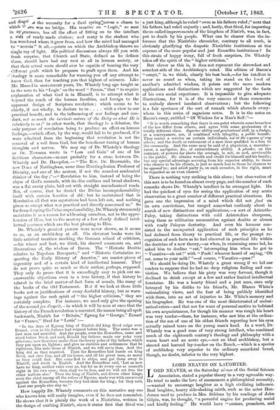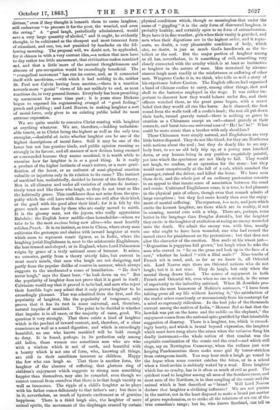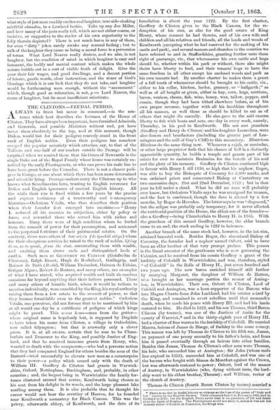LORD NERVES ON LAUGHTER.
LORD HEAVES, at the Saturday seance of the Social Science Association, stated a popular theory in a very agreeable way. He tried to make the love of amusement a philosophical necessity, —wanted to encourage laughter as a high civilizing influence. Real laughter, hearty side-shaking mirth, such as the actor Hen- derson used to produce in Mrs. Siddons by his readings of John Gilpin, was, he thought, "a powerful engine for producing social and kindly feeling." He would have "orators, preachers, and divines," even if they thought it beneath them to cause laughter, still endeavour " to procure it for the poor, the wearied, and even the erring." A " good laugh, periodically administered, would save a very large quantity of alcohol," and it ought, he evidently thought, to be cultivated as the cheapest and most innocent form of stimulant, and one, too, not punished by headache on the fol- lowing morning. The proposal will, we doubt not, be applauded, for it chimes in with a very current idea,—a notion that men have to day rather too little amusement, that civilization makes mankind sad, and that a little- more of the ancient thoughtlessness and absence of pre-occupation would be exceedingly beneficial. The " evangelical movement" has run its course, and, as it connected itself with asceticism,—.with which it had nothing to do, neither St. Paul nor Calvin having been ascetics,—there is a reaction towards more " genial " views of life not unlikely to end, as most reactions do, in very general licence. Everybody has been preaching up amusement for some time past ; it is years since Dickens began to expound his regenerating evangel of "good feeling," punch and pudding ; and Lord Neaves, in making laughter a sort of moral force, only gives to an existing public belief its most extreme expression.
We are quite unable to conceive Christ roaring with laughter at anything whatever. We are, therefore,—holding unfashion- able tenets, as to Christ being the highest as well as the only true exemplar,—doubtful ab initio whether laughter can be one of the highest descriptions of moral force. Still it may be one of the lower but not less genuine kinds, and public opinion running so strongly in its favour, and all manner of new devices being excused or commended because they amuse mankind, it is worth while to examine how far laughter is in as a good thing. Is it really a product of the higher instincts of man's nature, or a mere grati- fication of the lower, or an outburst of semi-physical emotion valuable or injurious only in its relation to its cause ? The instinct of mankind has, undoubtedly, decided in favour of the first theory. Men in all climates and under all varieties of culture do instinc- tively trust and like those who laugh, as they do not trust or like the habitually grave. This confidence does not arise from the sym- pathy which the evil have with those who are evil after their kind, or the good with the good after their kind ; for it is felt by the grave much more than by those who are easily moved to mirth. It is the gloomy man, not the joyous, who really appreciates Rabelais ; the English lower middle-class householder—whom we take to be the most anxious being now alive—who most heartily relishes Punch. It is an instinct, as true in China, where every man cultivates the grotesque and shakes with inward laughter at roots which seem to represent comic figures, as in India, where the laughing jovial Englishman is, next to the aristocratic Englishman, the best trusted and obeyed; or in England, where Lord Palmerston reigns by grace of a truly national sense of humour. It arises, we conceive, partly from a theory utterly false, but current in most men's minds, that men who laugh are not designing, and partly from the popular dislike of reserve in manner, which always suggests to the uneducated a sense of humiliation. " He don't sever laugh," says the Essex boor, " he look down on we." But the popularity of laughter does not prove that it is good in itself ; Calvinists would say that it proved it to be bad, and men who reject their horrible logic may admit that it only proves laughter to be exceedingly pleasant. That was admitted from the first, and the popularity of laughter, like the popularity of vengeance, only proves that it has its root in some universal, and, therefore, natural impulse of mankind. The point to be decided is whether that impulse is in all cases, or the majority of cases, good. We question it very strongly. That there exists a kind of laughter which is the product of inward content, and, therefore, of a clear -conscience as well as a sound digestion, and which is exceedingly beautiful, no one who knows mankind will be bold enough to deny. It is found, perhaps, in its perfection only among ,old ladies, those women one sometimes sees who are wise with a wisdom which is not of earth, and beautiful with a beauty which is not one of form, who, knowing all things, are still in their saintliness innocent as children. Happy the few who can laugh so. That there is another form, the laughter of the absence of suffering, that glorious ring of children's enjoyment which suggests to strong men something happier than themselves, may also be conceded, even though we cannot conceal from ourselves that there is in that laugh vacuity as well as innocence. The ripple of a child's laughter as he plays with his father comes deliciously to that father's ear ; but there is in it, nevertheless, as much of hysteric excitement as of genuine happiness. There is a third laugh also, the laughter of mere animal spirits, the movement of the diaphragm created by certain
physical conditions which, though so meaningless that under the name of " giggling" it is the only form of distrusted laughter, is probably healthy, and certainly open to no form of animadversion. Boys have it in fine weather, girls when their vanity is gratified, and men when their digestions are in the highest order, and it repre- sents, no doubt, a very pleasurable condition of body, which also, no doubt, is just as much God's handiwork as the in- tellect or the soul. But the major portion of laughter among us all has, nevertheless, in it something of evil, something very closely connected with the cruelty which is at least as instinctive as laughter in the nature of man. Men untrained by circum- stances laugh most readily at the misfortunes or suffering of other men. Wingrove Cooke it is, we think, wha tells so well a story of his experience before Canton. The English officers had organized a band of Chinese coolies to carry, among other things, shot and shell to the batteries employed in the siege. It was rather im- portant to discover how they would behave under fire, and their officers watched them, as the great game began, with a secret belief that they would all run like hares. As it chanced, the first round from the walls took off a coolie's head ; the rest all put down their loads, turned gravely round—there is nothing so grave in creation as a Chinaman except an owl—stared gravely at their comrade, and burst into one universal roar of " He ! he ! he!" What could be more comic than a brother with only shoulders ?
Those Chinamen were simply natural, and Englishmen are very little better disposed. They do not like blood, for they are Northerns with notions about the soul ; but they do dearly like to see any- body hurt, to see an old lady trip up, or a young man knocked down, or any human being in any position exquisitely painful, yet into which the spectators are not likely to fall. They would not laugh, we confess, at an operation for the stone ; but they would most unequivocally at the fall of a cab, which smashed the passenger, ruined the driver, and killed the horse. We have seen them do it, and the whole jest of an ordinary pantomime consists in an appeal to that innate sense of association between the cruel and comic. Cultivated Englishmen cease, it is true, to feel pleasure in the physical pain of others, though even that remark admits of large exceptions ; but they feel more keenly than ever the enjoy- ment of mental suffering. The repartees, bon mots, and jests which excite the keenest laughter, are those which are in reality, if not in seeming, mental cuts with a whip. There are, perhaps, none better in the language than Douglas Jerrold's, but the laughter they excite is the laughter of exultation at seeing an enemy wounded unto the death. We admit the enemy was, with him, usually one who ought to have been wounded, one who had roused the sacred crave for punishment on the pretentious ; but that does not alter the character of the emotion. Men smile at his wisest jest- " Dogmatism is puppyism full grown," but laugh when he asks the man who craved to "lie on the grass and look up in the face of a cow," whether he looked "with a filial smile?" Nine-tenths of French wit is cruel, and, as far as we know it, all Oriental wit. Lord Neaves says there are Oriental nations who do not laugh ; but it is not true. They do laugh, but only when the mental thong draws blood. The source of enjoyment in both French and Oriental wit, even when no one is struck, is the sense of superiority to the imbecility satirized. When M. Jourdain pro-
nounces the most humorous of Moliere's sentences, " I have been talking prose all my life without knowing it," the satisfaction of the reader arises consciously or unconsciously from his contempt for a mind so supremely ridiculous. In the best joke of the thousands current among the natives of India, "Monson fled so fast that the howdah was put on the horse and the saddle on the elephant," the enjoyment comes from the national spite gratified by that inimitable suggestion of disarray. There is a laughter, too, which is exceed-
ingly hearty, and which is brutal beyond expression, the laughter which must have rung above the arena when the retiarius flung his deadly instrument—the whole notion of that combat was the exquisite combination of the comic and the cruel—and which still rings, say on Newington Causeway, when the ruffians just now keeping Pandemonium there make some girl fly terror-stricken from outrageous insult. You may hear such a laugh go round in the bogus when some convict catches the baton, or in a school when a tired urchin is suddenly waked by a weal. Even laughter which has no cruelty, has in it often as much of evil as good. The quickest road to laughter among all men of the Southern races, and most men of the Northern, is in that coupling of the comic and the
animal which is beat described as " broad." Will Lord Neaves
declare that laughter a civilizing influence? We are not purists in the matter, not in the least disposed to make a broad jest matter
of grave reprehension, or to strike all the relations of sex out of the true comedian's range; but he, who knows Scotland, can tell ua
what style of jest most readily excites real laughter, true side-shaking mirthful abandon, in a Lowland bothie. Take up any Joe Miller, and how many of the jests really tell, which are not either coarse, or incisive, or suggestive to the reader of his own superiority to the folly therein depicted? There is not much harm in any of them, for even " dirty " jokes rarely awake any sensual feeling ; but to talk of the laughter they cause as being a moral force is a perversion of terms. What Lord Neaves really desires, and we also, is not laughter, but the condition of mind in which laughter is easy and innocent, the bodily and mental content which makes the whole nature bubble out in a sort of visible froth of delight. Give the poor their fair wages, and good dwellings, and a decent portion of leisure, gentle words, clear instruction, and the share of God's blessings which it is our luck that they do not take, and laughter would be forthcoming soon enough, without the "amusement" which, though good as relaxation, is not, p Ice Lord Neaves, the cause of laughter, but its most insufficient substitute.
































 Previous page
Previous page